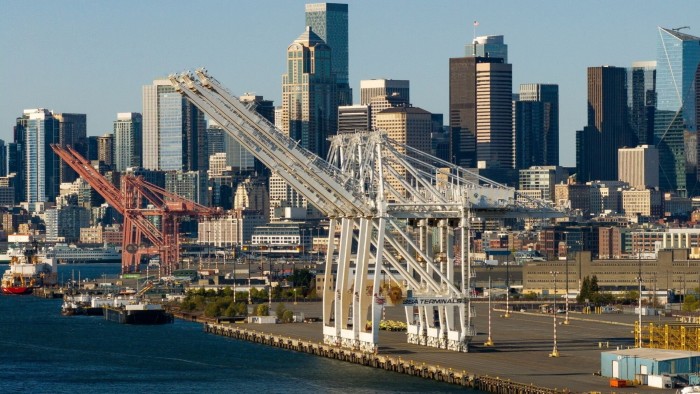Unlock the White House Watch newsletter for free
Your guide to what the 2024 US election means for Washington and the world
The Trump administration will begin imposing fees on Chinese-built ships docking in US ports as it tries to spur US shipbuilding, in a move likely to escalate trade tensions between Washington and Beijing.
The US presented plans in a filing late on Thursday to phase in steep charges on Chinese-owned or built ships carrying cargo to US ports over several years.
The fees are part of an effort to increase the pressure on China over what Washington argues are unfair trade practices, while boosting the domestic manufacturing of ships. However, they have caused alarm among US exporters.
US farmers have expressed dismay that an overly punitive fee structure would harm their ability to export goods by forcing ships to visit fewer American ports in an attempt to reduce the fees they have to pay.
Jamieson Greer, Donald Trump’s trade representative, said in a statement that the US would charge fees to vessel owners and operators from China of $50 per net ton beginning in 180 days, increasing by $30 per net ton over the following three years. Operators of Chinese-built ships would be charged a lower amount.
“Ships and shipping are vital to American economic security and the free flow of commerce,” said Greer.
“The Trump administration’s actions will begin to reverse Chinese dominance, address threats to the US supply chain, and send a demand signal for US-built ships,” he said.
One person in the shipping industry in China familiar with the matter said the new proposal represented a softening of the US trade representative’s original proposal, which had raised the possibility of levying fees based on shipping operators’ ownership of Chinese-built vessels in their fleets.
This would have meant all vessel operators would have been liable for fees just for owning Chinese ships.
Under the new proposals, non-Chinese owned shipping companies could avoid paying any port fees by using non-Chinese built vessels on US routes. Chinese shipping lines, however, would still be badly hit by the fees.
China’s foreign ministry on Friday warned the US that “measures such as imposing port fees . . . not only drive up global shipping costs” and disrupt supply chains but would also “increase inflationary pressure within the United States, harming American consumers and businesses”.
“These actions will not revive the US shipbuilding industry,” the ministry said, adding that China would take “necessary measures” to protect its interests.
Greer’s office said the US would also impose “limited restrictions” on foreign vessels carrying liquefied natural gas, but restrictions would not begin for three years and would increase over a 22-year timeframe.
The fees would be based on the number of voyages to the US, and not applied for each port in the country visited on the same trip, reducing the risk that ships would skip smaller ports and harm US exporters.
The US trade representative’s office added that empty ships arriving to export goods from the country would not be charged.
Additional reporting by Nian Liu in Beijing

